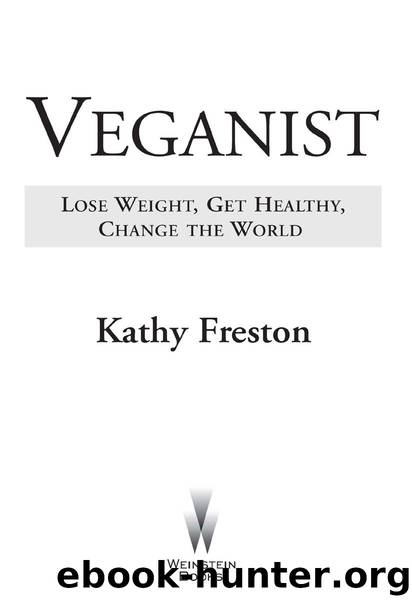Veganist by Kathy Freston

Author:Kathy Freston
Language: eng
Format: mobi, epub
Publisher: Weinstein Publishing
Published: 2011-08-03T10:00:00+00:00
* * *
Every time we go to the grocery store or out to eat, we get a chance to vote against wasteful spending, simply by not buying meat, eggs, and dairy products.
* * *
We may not be able to direct large-scale government spending anytime soon, but one area where we do have control is in how we spend at the market. Every time we go to the grocery store or out to eat, we get a chance to vote against wasteful spending, simply by not buying meat, eggs, and dairy products. Eventually, these individual acts of ours will change the economics of agriculture, with vegetables and fruits and nuts and grains competing on a level playing field against animal agriculture.
The High Price of Poop
The government’s gross spending only gets grosser when we’re faced with this scary statistic: pound for pound, a pig produces four times as much waste as a person does. According to the Union of Concerned Scientists, factory farms generate about 300 million tons of manure every year. That’s more than double the amount produced by the country’s entire human population!
Plus, densely stocked fish farms—the fastest growing form of agriculture in the world—also produce tremendous amounts of waste—everything from uneaten, chemical-laden fish feed to fish feces—that can wreak havoc on local ecosystems.
What does that have to do with you and me? All the waste produced on these farms has to go somewhere. And guess who pays for the cleanup? It’s not the factory farmers…
Highly polluting factory farms are being prioritized for government funding, but no federal guidelines regulate how factory farms spend that money to treat, store, and dispose of the one trillion pounds of animal excrement that they produce every year. Factory farms often pump animal waste into huge, putrid manure lagoons, or spray it over crops as fertilizer. Both of these disposal methods result in run-off that contaminates the soil and water and kills fish and other wildlife. There are numerous reports that humans who live near factory farms have become sick from the pollution—many suffer from respiratory ailments, neurological problems, and as suggested by a 2010 review in the Journal of Animal Science, the stench from these factory farms can cause sexual dysfunction: “Some odors may destroy normal positive pheromone responses resulting in impaired sexual function for people living in the vicinity of CAFO.” More hidden costs.
Americans eat, on average, some 200 pounds of meat, poultry, and fish (not to mention eggs and dairy products) per person per year. Part of the reason for this high consumption of animal protein is, of course, the low cost.
Corporate welfare in the form of agricultural subsidies, as well as cost-cutting practices on factory farms that include crowding animals together by the thousands in filthy warehouses and grinding up the scraps from dead animals and feeding them back to the survivors, have made meat cheap and readily available. What all this means is that the true and unacceptably high “cost” of meat—to our health, to the welfare of animals, to our precious ecosystem—is hidden behind a wall of price manipulations and other illusions.
Download
This site does not store any files on its server. We only index and link to content provided by other sites. Please contact the content providers to delete copyright contents if any and email us, we'll remove relevant links or contents immediately.
How to Be a Bawse: A Guide to Conquering Life by Lilly Singh(7486)
Deep Work by Cal Newport(7085)
The Longevity Diet by Valter Longo(5065)
The Fat Loss Plan by Joe Wicks(4921)
The Four-Pack Revolution by Chael Sonnen & Ryan Parsons(3980)
The Ultimate Bodybuilding Cookbook by Kendall Lou Schmidt(3945)
The French Women Don't Get Fat Cookbook by Mireille Guiliano(3662)
Not a Diet Book by James Smith(3429)
Super Food Family Classics by Jamie Oliver(3420)
Factfulness_Ten Reasons We're Wrong About the World_and Why Things Are Better Than You Think by Hans Rosling(3239)
Turn Up Your Fat Burn! by Alyssa Shaffer(3217)
Self-Esteem by Matthew McKay & Patrick Fanning(3144)
Tom Kerridge's Dopamine Diet: My low-carb, stay-happy way to lose weight by Kerridge Tom(3110)
Body Love by Kelly LeVeque(3060)
The Unbecoming of Mara Dyer by Michelle Hodkin(3048)
Tone Your Tummy Type by Denise Austin(2847)
The Fat Chance Cookbook by Robert H. Lustig(2836)
LL Cool J's Platinum 360 Diet and Lifestyle by LL Cool J(2736)
Men's Health Best by Men's Health Magazine(2605)
